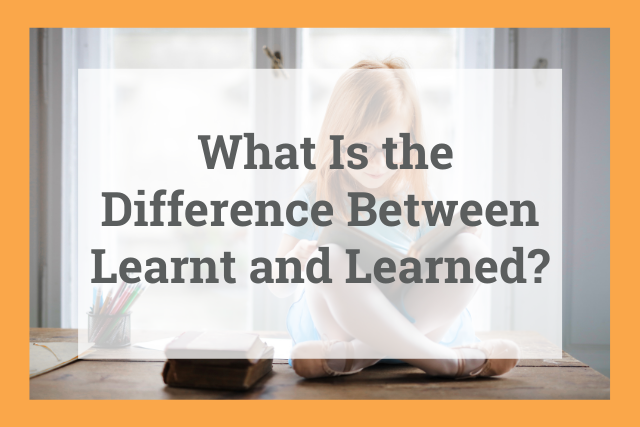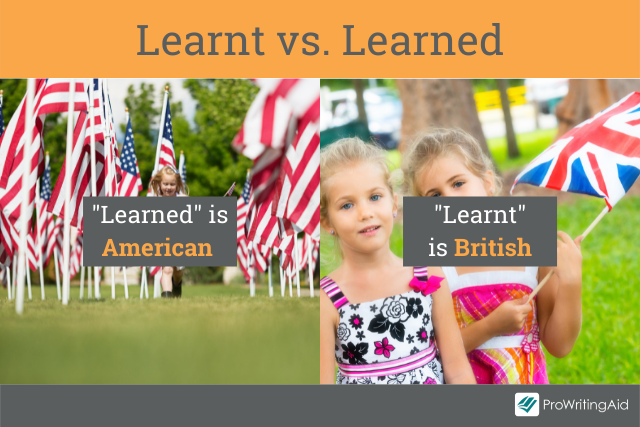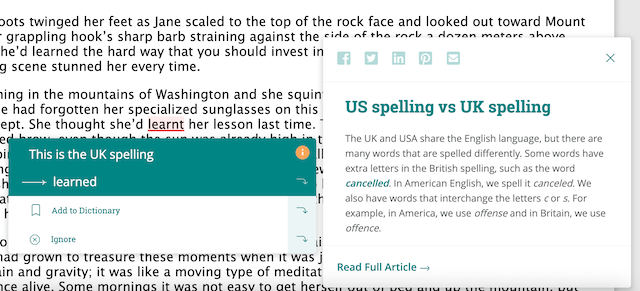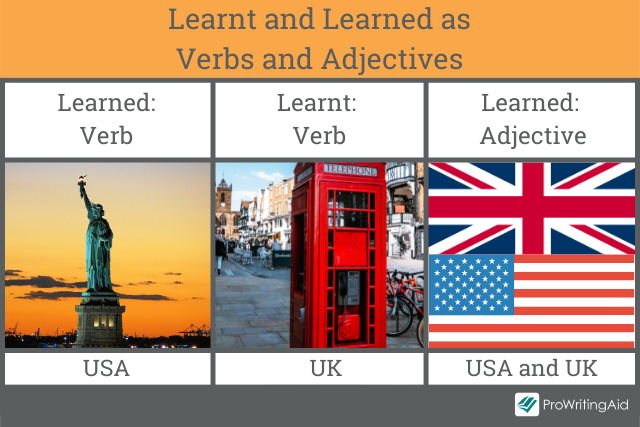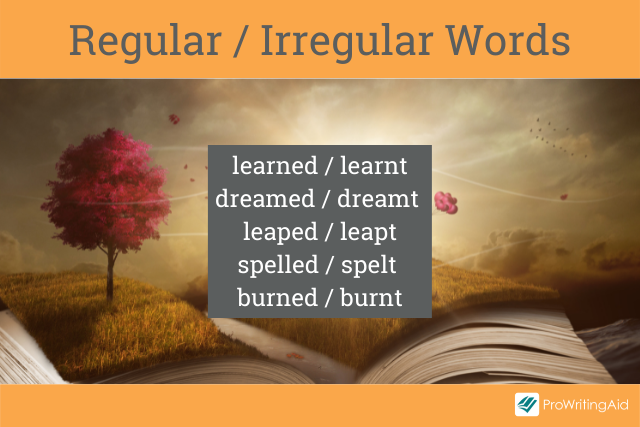Do you ever spend ages staring at a word, wondering if you have spelled it correctly?
Often, even if you have got it right, you will second-guess and convince yourself it is wrong. Consider the following example:
- I learned to ride a motorbike last year while on holiday in Greece.
At first glance that sentence looks fine, but then you start to wonder—is learned spelled correctly? Consider the alternative:
- I learnt to ride a motorbike last year while on holiday in Greece.
That looks right too, doesn’t it? Or does it?
Unfortunately, one of the joys of language, and in particular the English language, is that there are so many variations in the rules.
In most cases, as we will see below, those variations are regional, because English has spread so far and wide.
That is the case for the two words we’ll be looking at today—learnt and learned.
What Is the Difference Between Learnt vs Learned?
Despite being spelled differently, in most cases they both mean exactly the same thing. Both learnt and learned are the past tense version of the verb to learn.
The only difference between the two words is that “learned” is the accepted spelling if you live in the United States or Canada, and “learnt” is the accepted spelling in the UK and other English-speaking countries.
However, it is important to know that both are perfectly acceptable to use, so don’t worry if you find yourself thinking that you have spelled one of them wrong!
Quick note: There is also an adjective learned which is always spelled with -ed and is pronounced learn-ed. More on this later.
What Do Learned and Learnt Mean?
To learn means «to acquire knowledge or information,» so learned or learnt mean you acquired that knowledge in the past.
If you’re from the US, you might say:
- I learned math in high school.
If you’re from the UK, you might say:
- I learnt maths in secondary school.
Just like with math / maths, the only differences between learned and learnt are the spelling and regions where they are each used.
Is Learnt Grammatically Correct?
Absolutely, yes! Learnt is used for the past tense form and past participle of the verb to learn by speakers of British English.
British English speakers will say learnt when referring to some sort of knowledge or information that they learned in the past. Thus, you would say, She learnt to play hockey at boarding school in Sussex. Consequently, when a British person is writing, or when someone is writing for a British publication, learnt is the correct way of writing it.
However, two other things are worth noting. Firstly, that the use of learned is also correct and is growing in popularity. Secondly, that the most important rule (not just here but in any circumstances where such issues come up) is to be consistent.
Whichever spelling you use the first time the word comes up, must be the same spelling you then use all the way through your writing.
How Do I Use Learnt in a Sentence?
- Anyone who learnt maths the old-fashioned way would have no idea how this new system works.
- That boy still hasn’t learnt his lesson.
- I learnt so much about life from watching Downton Abbey.
- I learnt to play the accordion four years ago.
- We learnt about the earthquake via social media.
When Do British People Use Learnt?
This depends on the writer. It is acceptable to use learnt or learned in British English. Some publications, like newspapers or websites, may have a style guide that tells its writers to use learnt, as in these headlines:
- Emma Raducanu: “I learnt so much from Wimbledon”—British teenager ready for US Open qualifying (BBC News)
- “How I Learnt to Love Atheists” by John Ward (The Guardian)
If you frequently mix up learned and learnt, install our browser extension to check your writing for consistent spelling across email, social media, online forms, and millions of other sites.
Set it to American English or British English and it will recognise the appropriate forms that are common in British English or American English and ensure you use the correct spelling.
Try ProWritingAid for free now.
Is Learned Grammatically Correct?
Yes, learned is just as grammatically correct as learnt. It is also more widely used, so people are less likely to think of it as an incorrect spelling.
Learned is used for the past tense form and past participle of the verb to learn by speakers of American English.
Speakers of American English will use learned in the same way that British English speakers use learnt—when referring to some sort of knowledge or information that they learned in the past. Thus, you would say, He learned to play soccer at high school in Seattle. Therefore, when an American person is writing, or someone is writing for an American publication, learned is the correct usage.
As noted above, neither learned or learnt would technically be wrong, as long as you pick one and use it consistently.
How Do I Use Learned in a Sentence?
- We learned so much about life from watching The Real Housewives of Orange County.
- She learned to tie her shoelaces much quicker than he did.
- James learned to dance by repeatedly watching Saturday Night Fever.
- I learned to play the double bass when I was four years old.
-
Sheila first learned about her husband’s affair whilst browsing on YouTube.
When Do Americans Use Learned vs. Learnt?
American English speakers will almost always use learned, unless they’re writing for a British English publication.
- “What We Learned and When We Learned It” by Andy Borowitz (NY Times)
- “I Learned How to Crochet in One Day with This Simple Kit” by Meghan Kavanaugh (USA Today)
Is Learnt a Word in Australian English?
Yes, it is. Most English-speaking countries around the world still frequently use the British English form of learnt. The only exceptions are the US and Canada.
Can I Use Learned as an Adjective?
There is one situation in which learnt and learned are not interchangeable, and that is when learned is used as an adjective.
The word learned can be used as an adjective when you want to describe a person or an object (such as a book) as scholarly.
Thus, you might say that someone is the most learned individual I have ever met or you might say of a periodical that it is a learned journal with detailed reviews of the latest poetry collections.
The main point however, when using learned as an adjective, is that you can only use learned with the American spelling. There is no such adjective as learnt.
Also, when it is used as an adjective it is pronounced slightly differently, with two distinct syllables in learn-ed rather than the one syllable learnd.
How Do I Use Learned as an Adjective?
Usually, you will use learned as an adjective by placing it before a noun, such as friend or colleague (i.e. the person you want to describe as scholarly).
- We are gathered here tonight to honour our learned colleague.
- The old, learned scientist looked at the government ministers he was advising and inwardly wept.
Why Are There Two Spellings of Learnt and Learned?
There are numerous word variations like learned / learnt in the English language—such as dreamed / dreamt, passed / past, leaped / leapt, spelled / spelt, or burned / burnt.
Regular and irregular verbs have been around since Middle English was first spoken.
However, the tendency in American English has always been towards making irregular verbs into regular verbs, and that appears to be happening in British English too.
As a consequence, the -ed ending is becoming more popular around the world and with the learned / learnt example in particular, the use of learnt seems to be dying out as learned goes from strength to strength—even in British English areas.
According to Google Ngram, learnt is very rarely used at all in American books, magazines, or journals whilst in British books, magazines, and journals, both are used.
Google Ngram also reveals that learned is now the preferred choice in British English too (although it is possible this result is taking into account the adjective learned).
Can I Use Learned or Learnt?
So, what have we learned? That use of learned or learnt as verbs will depend on where you live or which country you are writing for (but both are acceptable in any country) whilst learned is the only correct spelling when used as an adjective.
Just as how you spell cancelled or canceled depends on whether you are from the UK or the US, so are you only likely to use learnt if you come from the UK.
And even then, as we have seen, this difference between the American and British English is dying out, as American English becomes more influential throughout the world and the easier, regular American spelling takes hold.
Take your writing to the next level:
20 Editing Tips from Professional Writers
Whether you are writing a novel, essay, article, or email, good writing is an essential part of communicating your ideas.
This guide contains the 20 most important writing tips and techniques from a wide range of professional writers.

Asked by: Adeline Hill III
Score: 4.4/5
(56 votes)
«Learnings» is the plural of «learning» in the sense of «(specific) things or lessons that have been learned». It is often considered nonstandard English, even though it is rather widely used.
Is it correct to say learnings?
Yes, the plural of learning is learnings. It appears in established expressions like new learnings (a medical term).
Is learnings in the dictionary?
1. The act, process, or experience of gaining knowledge or skill. 2. Knowledge or skill gained through schooling or study.
Why are people saying learnings instead of lessons?
As the website The Grammarist, says: “Learnings is a pluralisation of an erroneous form of learning as a singular noun. Said singular noun (eg, a learning) does not exist, at least according to most dictionaries.
What is a better word than learnings?
Frequently Asked Questions About learning
Some common synonyms of learning are erudition, knowledge, and scholarship.
25 related questions found
What is the synonym of knowing?
adj.experienced, aware.
What are the key learnings?
A Key Learning is a high level overview of what you want students to know, understand or be able to do along with values or attitudes they have attained at the end of a unit. It can be a summary of your learning intentions that demonstrates the «why» of the unit.
Why are people saying learnings?
It could mean “to absorb knowledge” as it does today, making it the reciprocal action (sometimes called the “converse”) of to teach. But it also meant “to impart knowledge,” making it a synonym of teach too.
What is the difference between learnings and lessons?
As verbs the difference between learn and lesson
is that learn is to acquire, or attempt to acquire knowledge or an ability to do something or learn can be while lesson is to give a lesson to; to teach.
Where does the word learnings come from?
‘Learning’, a word of Germanic origins first recorded here in Anglo-Saxon times, is an abstract noun that is ordinarily used in the singular. It means ‘the acquisition of knowledge’ or ‘knowledge acquired through study’.
When did learnings become a thing?
Usage notes
The term learnings was not in common use in the 19th and 20th century, though the countable noun sense learning (“thing learned”) dates to Middle English (14th century; see leornyng), and the plural learnings to Early Modern English.
What are your learnings means?
Filters. Learnings is defined as knowledge gained. Examples of learnings are discovering new techniques for building a product. noun. 1.
What are the learnings from a project?
Lessons learned definition
Lessons learned is the knowledge gained from the process of conducting a project. This includes the positives and negatives. The idea is to repeat the positives aspects and not repeat the mistakes.
How do you use learning in a sentence?
Learning sentence example
- You are learning about them today. …
- I want you to start learning what it means to be in charge of something. …
- I’m learning a lot. …
- He reiterated his concern about anyone outside our group learning of what we were doing.
What is learning in simple words?
Learning is “a process that leads to change, which occurs as a result of experience and increases the potential for improved performance and future learning” (Ambrose et al, 2010, p. 3). The change in the learner may happen at the level of knowledge, attitude or behavior.
What are examples of learning?
Knowledge or skill gained through schooling or study. The definition of learning is the process or experience of gaining knowledge or skill. An example of learning is a student understanding and remembering what they’ve been taught.
What does New learning mean?
1 : learning of the 15th and 16th centuries based on the study of the Bible and the classics (as Greek) in the original. 2 : the learning and doctrines of the English Reformation.
What are the learning outcomes?
Learning outcomes are user-friendly statements that tell students what they will be able to do at the end of a period of time. They are measurable and quite often observable. … focus on student products, artifacts, or performances, rather than on instructional techniques or course content.
What do you mean by takeaways?
1 : a conclusion to be made based on presented facts or information : a main point or key message to be learned or understood from something experienced or observed The takeaway is clear: cats are a growing environmental concern because they are driving down some native bird populations …—
Are lessons learned or Learnt?
Both versions of the word are actually correct and widely used in the English-speaking world, but there is one small difference between the two words. ‘Learned’ is the preferred way of spelling in the US and Canada, while ‘learnt’ is favoured in British English.
What is KLA in teaching?
A Key Learning Area (KLA) is a subject or discipline within the primary education field. Primary school teachers are required to possess knowledge of the KLAs in order to teach within the primary curriculum. The KLAs are a compulsory component for all primary education students in any primary teaching degree.
What are key learnings in business?
7 Key Learnings from the 2016 Responsible Business Summit
- Passionate leadership is key. …
- Collaborate with critics and competitors too! …
- Building trust is not only paramount, but a collective effort. …
- Imbue your employees with a direction and a sense of purpose.
What are the three basic types of learning?
The three basic types of learning styles are visual, auditory, and kinesthetic. To learn, we depend on our senses to process the information around us. Most people tend to use one of their senses more than the others.
«Learnings» is the plural of «learning» in the sense of «(specific) things or lessons that have been learned». It is often considered nonstandard English, even though it is rather widely used. If you are only talking about general knowledge rather than specific things you have learned, I would definitely use the singular «learning».
Wiktionary has rather thorough usage comments on the word «learnings»: https://en.wiktionary.org/wiki/learnings
The term learnings was not in common use in the 19th and 20th century, though the countable noun sense learning (“thing learned”) dates to Middle English (14th century; see leornyng), and the plural learnings to Early Modern English. Note that early use of learnings often have the sense or connotation “teachings” (see examples above), as was the case of learn generally. It has found occasional use for centuries, including by Shakespeare,[1][2] and parallel constructions are commonplace – compare teachings and findings.
However, from circa 2000 it became a buzzword in business speak, particularly in constructions such as “key learnings” or “apply these learnings”; this was preceded by occasional educational use from the 1950s. Some disapprove of this, and it sounds ungrammatical enough to be used as an example of broken English, as in the comedy Borat: Cultural Learnings of America for Make Benefit Glorious Nation of Kazakhstan (2006). Suggested alternatives include lessons learned, “things one learned” – or simply lessons – discoveries, findings, insights, and takeaways.
«Learning to live with ‘learnings’» from CS Monitor (2021) comments:
Learnings is often seen as pretentious and useless business jargon, but its cousin teachings is pretty unobjectionable. What’s the difference?
Learnings surged in popularity during the 1950s, in business jargon and edu-speak, which did little to make it seem more “correct.” But it is now used widely. We’ll have to endure learnings for the foreseeable future.
На основании Вашего запроса эти примеры могут содержать грубую лексику.
На основании Вашего запроса эти примеры могут содержать разговорную лексику.
такое слово
такого слова
таким словом
подобного слова
это слово
There is such a word — responsibility to the reader.
Есть такое слово — ответственность перед читателем.
Other languages have not needed to invent such a word, since they do not know the phenomenon.
Другим языкам не нужно было придумывать такое слово, поскольку сей феномен им незнаком.
When you observe such a word, it gets narrower toward its end like railroad tracks.
Когда смотришь вдоль такого слова, оно сужается к концу, как рельсы железнодорожного пути».
Of course, he didn’t use such a word.
Almost every inhabitant of the modern world is familiar with such a word as «etiquette».
Практически каждый житель современного мира знаком с таким словом как «этикет».
By hovering over such a word or clicking on it, the user is shown the ad’s profile and is taken to its landing page or web site.
Нависая над таким словом или нажимая на него, пользователю отображается профиль объявления и отправляется на его целевую страницу или на веб-сайт.
You know, there’s such a word «needed».
There is such a word — burdock. I do not want my customers to feel burdock.
Есть такое слово — лопух. Я не хочу, чтобы мои покупатели чувствовали себя лопухами.
Could not understand why he chose such a word.
Не могла понять, почему он выбрал такое слово.
There is such a word, however.
Grammar past never understood that such a word, and they were unable to determine the most basic element of their subject matter.
Грамматики прошлого никогда не понимали, что такое слово, и им не удалось определить самый основной элемент их предмета.
For the majority such a word will flash out without result, but a broadened consciousness will vigilantly grasp each sign.
Для большинства такое слово мелькает без последствий, но расширенное сознание охватит зорко каждый знак.
Moreover, as far as is known, in most Turkic languages such a word was absent.
При этом, насколько известно, в большинстве тюркских языков такое слово отсутствовало.
He replied in the spirit of Suvorov’s soldier: Our company has no such a word.
Он, в духе суворовского солдата ответил: «В нашей компании такого слова нет.
As with «traditional» (if such a word can be used) tissue scaffolds, it was then seeded with heart cells.
Как и в «традиционных» (если такое слово здесь можно употребить) тканях подмостков, они посеяны вместе с сердечными клетками.
Sometimes translating such a word or phrase would render the translated version meaningless so the temptation for the translator may be to leave it out altogether.
Иногда перевод такого слова или фразы отдал бы переведенную версию, бессмысленную, таким образом, искушение для переводчика может состоять в том, чтобы пропустить его в целом.
Where did you learn such a word?
There has never been such a word in English.
Такого слова никогда не существовало в английском.
There isn’t such a word in French.
They may not have such a word in Italian.
Результатов: 130. Точных совпадений: 130. Затраченное время: 219 мс
Documents
Корпоративные решения
Спряжение
Синонимы
Корректор
Справка и о нас
Индекс слова: 1-300, 301-600, 601-900
Индекс выражения: 1-400, 401-800, 801-1200
Индекс фразы: 1-400, 401-800, 801-1200
Предложите, как улучшить StudyLib
(Для жалоб на нарушения авторских прав, используйте
другую форму
)
Ваш е-мэйл
Заполните, если хотите получить ответ
Оцените наш проект
1
2
3
4
5

